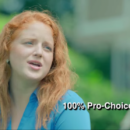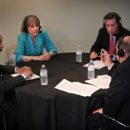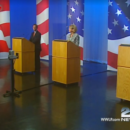Now a look at what’s become a big issue in the campaign for Massachusetts governor. In Democrat Martha Coakley’s primary night victory speech, she made a promise.
“When I am governor, there will be universal pre-K for all children,” Coakley said.
But Republicans are calling her pledge just another empty promise from a career politician. So we decided to look into Coakley’s vision and what it could mean for Massachusetts children.
Earlier this week in Quincy, Coakley engaged in one of those awkward rituals of the election season: She played with 3- and 4-year-olds in front of flashing cameras.
“You like coming to school here?” she said. “It’s fun, isn’t it?”
Coakley sat down to a make-believe lunch, with plastic food, with a little girl named Jasmine.
“Would you like to join me and help me in lunch?” the attorney general asked.
“Um, no,” Jasmine replied. “That’s fake.”
“That’s fake,” Coakley laughed. “Good. I’m glad you told me before I started.”
“Just don’t put your real mouth on it.,” the girl warned.
Jasmine is in a Head Start class, which is only one way of getting a pre-K education in Massachusetts. The system is really a mishmosh. Some kids stay home, some attend public pre-kindergarten and others go to private pre-schools.
Most parents need to pay tuition. But for those who make less than 200 percent of the poverty level (and for a family of 3 that would be about $40,000 a year), they could get a voucher from the state.
But Noah Berger, president of the Massachusetts Budget and Policy Center, says it doesn’t always work like that.
“It’s not an entitlement,” Berger says. “A lot of people can be eligible, but if the state doesn’t have money, they don’t get child care.”
Instead, they get a spot on a waiting list. There are 17,000 kids on the list right now. Coakley, while visiting the Quincy school, talked of her plan to get vouchers to everyone on the waiting list.
“That is the goal obviously,” she said. “We want to best for our kids from cradle through all of their education. This is a great place to start.”
Coakley had been calling her plan “universal pre-K” during the primary, but has since stopped doing so. And it is significantly less ambitious – and less costly – than making sure all kids in the state get free preschool regardless of income. Coakley’s campaign says her plan would cost an extra $150 million.
Berger says truly universal pre-K would cost $1.4 billion.
“[That would] almost definitely require new tax revenue,” he says. “And that’s something the legislature has not been excited about so far.”
Coakley suggests it would be a better use of resources to focus on low income kids. And research does show they benefit more from pre-k than wealthier kids. How large a benefit is debatable.
Two landmark studies in the ’60s and ’70s found that low income kids who went to preschool showed some academic improvement and were more likely to avoid teen pregnancy and arrest later on. But some education experts point to a 2012 federal study that demonstrated most of the benefits of Head Start had vanished by the end of third grade.
And that’s Republican nominee for governor Charlie Baker’s point.
“Pre-K that isn’t followed by terrific elementary education is a lot of the benefit of the pre-K disappears over the next few years,” he says. “We need to make sure there’s a runway here between pre-K into strong elementary and middle school and high school education.”
Neither candidate is talking about what preschool providers identify as the main problem. Even if the waitlist is cleared entirely, they say the state subsidies are too small.
Beth Ann Strollo leads Quincy community action programs, where Coakley visited this week.
“The reimbursement is about 30 or 40 percent of the actual cost of early childhood statewide,” Strollo says. “People ask what’s the cost of care? And the state’s reimbursement rate is not even half of what that cost of care is.”
This debate over pre-school and how to pay for it is an annual one in Massachusetts. Most recently, just last year, Governor Deval Patrick proposed clearing the voucher waiting list. It didn’t happen.
He says the challenge is, “Money! Is the principle one. […] And the legislature just wasn’t ready to go there.”
House Majority Leader Ron Mariano, a Democrat, says lawmakers might be ready this time.
“I look forward to a recommitment the next budget season,” Mariano said, “depending how the economy goes.”
And that’s a big qualification.




